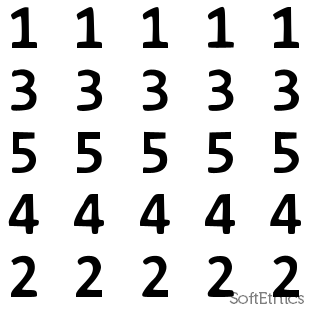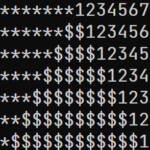#include <stdio.h>
int main()
{
int n = 5;
int i,j;
int x = 1, y = n * 2;
for(i = 1; i <= n; i++)
{
for (j = 1; j <= n; j++)
{
if (i <= n / 2 + 1)
{
printf("%2d ", x);
}
else
{
printf("%2d ", y);
}
}
x += 2;
y -= 2;
printf("\n");
}
return 0;
}
#include <iostream.h>
int main()
{
int n = 5;
int x = 1, y = n * 2;
for(int i = 1; i <= n; i++)
{
for(int j = 1; j <= n; j++)
{
if (i <= n / 2 + 1)
{
cout<<x<<" ";
}
else
{
cout<<y<<" ";
}
}
x += 2;
y -= 2;
cout<<endl;
}
return 0;
}
class PatternProg
{
public static void main(String args[])
{
int n = 5;
int x = 1;
int y = n * 2;
for (int i = 1; i <= n; i++)
{
for (int j = 1; j <= n; j++)
{
if (i <= n / 2 + 1)
{
System.out.print(x+" ");
}
else
{
System.out.print(y+" ");
}
}
x += 2;
y -= 2;
System.out.println();
}
}
}
using System;
class PatternProg
{
public static void Main()
{
int n = 5;
int x = 1;
int y = n * 2;
for (int i = 1; i <= n; i++)
{
for (int j = 1; j <= n; j++)
{
if (i <= n / 2 + 1)
{
Console.Write(x + " ");
}
else
{
Console.Write(y + " ");
}
}
x += 2;
y -= 2;
Console.WriteLine();
}
Console.ReadKey(true);
}
}
n = 5
d = 1
e = n * 2
for x in range(1, n + 1):
for y in range(1, n + 1):
if x <= n // 2 + 1:
print(d, end=" ");
else:
print(e, end=" ");
d += 2
e -= 2
print()




